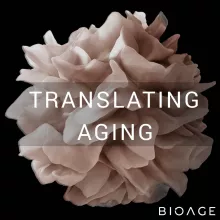Episode shownotes
Optimizing Healthspan through Longevity Medicine (Dr. Andrea Maier – The Center for Healthy Longevity)
Dr. Andrea Maier is an internal medicine specialist, geriatrician, and researcher whose work focuses on age-related disease, cellular senescence, and the translation of longevity science into clinical practice. Among her academic appointments are professorships at the Free University, Amsterdam and the Netherlands, the University of Melbourne in Australia, and the National University of Singapore, where she also serves as the co-director of the Center for Healthy Longevity.
On today’s episode, Dr. Maier joins host Chris Patil to discuss longevity medicine, her goals for building credibility in this emerging specialty, and how lifestyle changes are key to intervening in the aging process. First, she explains that longevity medicine means optimizing the state of health of an individual before a disease occurs by antagonizing the aging processes to be healthier for longer. This focus on delaying age-related disease differentiates longevity medicine from other specialties in its proactive attempt to prolong the healthspan rather than reacting after a disease has already occurred. Dr. Maier goes on to state her goals for this specialty, including educating laypeople and medical professionals, building a credible foundation and guidelines, and accelerating research in the field. She also suggests some promising areas of research, from diagnostic clocks to the credibility of supplements, as well as discussing lifestyle changes, an intervention already known to be effective against age-related disease. Dr. Maier then discusses her involvement with the first publicly funded outpatient clinic in longevity medicine, which she’ll be opening in Singapore in 2023, and the services it will provide. Finally, Dr. Maier closes the episode with her thoughts on democratizing longevity medicine and the future of the specialty, including her hope that, within ten years, we will see a shift toward preventing and lowering age-related diseases.
Episode Highlights:
- What is longevity medicine?
- Building credibility in a new specialty
- The long-term impact of supplements and lifestyle changes
- Dr. Maier’s new outpatient clinic
- Democratizing longevity medicine
Quotes:
“What we would like to achieve is to optimize that function at that moment in time for that individual. And optimizing function means optimizing the cognitive function but also the physical function to prevent that age-related disease.”
“Nobody really knows or has really described what the effect is of these supplements over the life course and for whom. I think consumers need to know what the return on investment is of taking these kinds of supplements. On the other side, physicians should know what the possible return of investment is if these kinds of supplements are prescribed to healthy individuals if any.”
“We have already interventions in place, we have diagnostics in place. And that’s the reason why I, as an internal medicine specialist, I’m opening the first longevity clinic in a publicly funded hospital because I think it’s time, and I think it’s unethical to not apply this knowledge to the population and just wait until disease occurs.”
“Most importantly is that we have to give individuals the choice what they would like to achieve because if we want, as healthcare professionals, too much, and people will not stick to our recipes, nothing will happen. So it has to be a shared decision-making on what to do and what to leave out.”
“We should deliver care to everybody who needs our help. And I would say helping means, in my view, to prevent age-related diseases, and thereby reduce the cost to the entire society.”
Links:
Email questions, comments,
